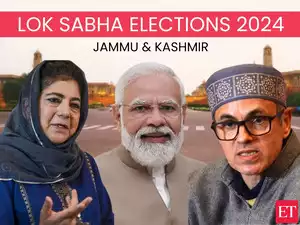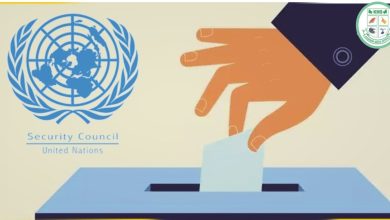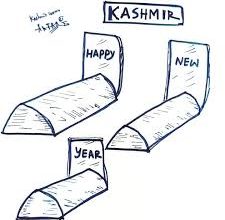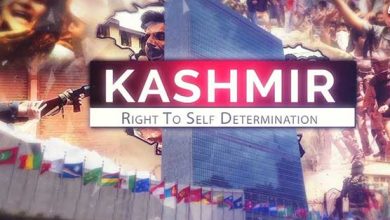Article: Elections alone are unlikely to satisfy Kashmiris’ aspirations

 Altaf Hussain Wani
Altaf Hussain Wani
The Election Commission of India (ECI) has officially announced a three-phase election for occupied Jammu and Kashmir (J&K), a region that was restructured and downgraded to two union territories following the abrogation of Article 370 on August 5, 2019.
After a 10-year hiatus, assembly elections are set to occur, marked by heightened security measures. As the region prepares for its upcoming assembly elections scheduled for September 18, 25, and October 1, the political atmosphere is buzzing with intrigue and unpredictability.
Kashmiris, experiencing unprecedented levels of assimilation and the erasure of their socio-political, religious, and cultural identity over the past five years, harbour a deep-seated distrust and uncertainty about the region’s future stability.
This announcement from the ECI follows a turbulent political climate catalyzed by the controversial removal of Articles 370 and 35A in 2019. The decision to revoke J&K’s statehood and reduce it to a centrally controlled territory has sparked widespread resentment among the indigenous population, significantly altering their relationship with the Indian state.
Many perceive this move as a betrayal by the Indian government, particularly by those Kashmiri political leaders, who have historically aligned with India, espousing secular and democratic values.
Since the BJP’s rise to power in India, their governance approach in J&K has involved imposing what many describe as draconian legislation, threatening the region’s unique identity, culture, and language. Alterations in the state’s domicile laws have further alienated the local populace, stoking fears of demographic dilution and cultural erosion. The ongoing militarisation and harsh law enforcement have starkly contradicted the government’s portrayal of normalcy in Kashmir.
Instead of fostering peace and reconciliation, the BJP-government, under Prime Minister Modi’s leadership, has continued a policy of disengagement and disempowerment, pushing an already marginalised community further to the fringes.
Despite initial reluctance, the Indian Supreme Court’s ruling on Article 370 pressured the government to begin a “democratic” process in the region.
A disheartening performance in the recent parliamentary elections forced the BJP to reassess its strategy, leading to a transfer of powers to the Lieutenant Governor. This move, perceived as acknowledging the shifting political dynamics, has met considerable resistance and disillusionment.
Concerns about the autonomy and effectiveness of the local government have escalated, with crucial powers now centralized under a Delhi-appointed administrator.
The expansion of administrative control in occupied Jammu and Kashmir, eroding local representation and weakening democratic institutions, reflects the Modi government’s intent to maintain its grip while presenting a facade of democratic engagement through elections.
So-called mainstream political parties, including the National Conference (NC) and the Peoples Democratic Party (PDP), have vehemently opposed BJP government’s power transfer and have consistently demanded the restoration of statehood. Their calls reflect a broader desire for self-governance and recognition of the unique challenges faced by the people of the region. The Modi-government’s hesitancy to meet these demands further exacerbates tensions and raises questions about the regime’s true intentions in Jammu and Kashmir.
Though the Mod government has promised to restore statehood status to J&K post-elections, scepticism about its sincerity persists. Even moderate Kashmiri politicians are disillusioned, especially younger leaders who reject the mere union territory status and distrust the BJP government, blaming it for the region’s hardships.
Recent parliamentary elections, however, have reignited hope among the populace, reflecting growing discontent with the status quo and a desire for change. The electoral success of independent candidates like Engineer Rashid signals a shift in public sentiment, emphasizing support for non-traditional political voices and narratives.
As the assembly elections approach, it remains to be seen how the BJP will navigate these challenges and whether it can reconcile its policies with the aspirations of the people of Jammu and Kashmir. Moreover, the delegation of power to an unelected administrator raises concerns about the relevance of a state assembly whose authority has been significantly diminished.
The legitimacy of these elections will hinge on whether the BJP and the Modi government can genuinely engage with local leaders to address the historical grievances fueling resentment against the Indian state.
In the coming months, Jammu and Kashmir will navigate a complex political landscape, balancing local aspirations, the BJP’s centralizing tendencies, and calls for the restoration of statehood.
If conducted fairly and transparently, the assembly elections can allow the people’s voices to be heard and a new political chapter to unfold. However, the harsh reality is that those who once loyally aligned with India now perceive the BJP’s authoritarian rule as a source of economic, political, and moral devastation in Kashmir.
A fair approach to resolving the Kashmir issue could pave the way for rebuilding a new Kashmir.
As time progresses, the Indian government must realize:
• Elections alone are unlikely to resolve the Kashmir issue or satisfy the aspirations of Kashmiris.
• Kashmiris’ aspirations extend beyond electoral politics; they seek the right to decide their future, an end to rights abuses and militarization, and recognition of their unique cultural and political identity.
• Only allowing them to exercise their choice under an independent authority can truly satisfy the collective aspirations of Kashmiris.
• Elections, while a step towards normalcy, do not address the core issues driving the conflict and should not be seen as a standalone solution.
A comprehensive approach involving inclusive dialogue, international mediation, recognition of Kashmir’s status, demilitarization, and human rights protection is necessary to truly satisfy the aspirations of Kashmiris.
Historically, India has used elections in Kashmir to project normalcy and democracy, aiming to convince the global community that the Kashmir issue is an internal matter resolved through democratic means. However, this strategy has become increasingly ineffective for several reasons.
The political landscape in occupied Jammu and Kashmir is at a crucial crossroads. The BJP’s governance strategy, marked by centralization and electoral manoeuvring, faces significant challenges from local political parties and civil society.
As the region prepares for assembly elections, the question remains: Will the BJP be able to reconcile its policies with the aspirations of the people, or will it continue to face the consequences of its actions in a region that has long been a crucible of political dissent and yearning for self-determination? Only time will tell.
*The author is the chairman of the Islamabad-based think tank, Kashmir Institute of International Relations and can be reached via email at Saleeemwani@hotmail.com, X@sultan1913








